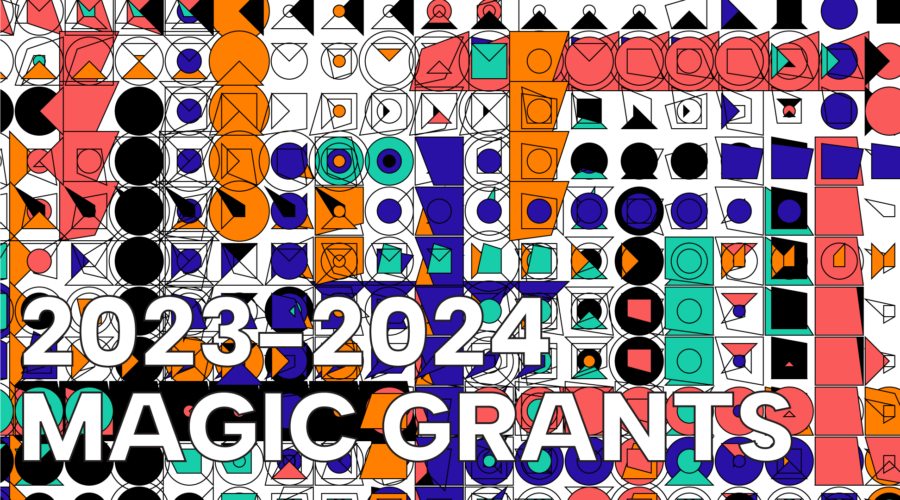The Brown Institute for Media Innovation, a groundbreaking partnership between Columbia Journalism School and Stanford University’s School of Engineering, is proud to announce its 2023-2024 Magic Grant recipients.
This is the Institute’s twelfth cohort of grantees — among the winners you will find journalists, filmmakers, an oral historian, computer and data scientists, political and social researchers, engineers, a sound artist, a cinematographer, and even a philosopher.
Some of these new grantees will report on pressing contemporary issues, such as the flooding in California or anti-Asian hate crimes, telling the stories of vulnerable communities in new ways. Others imagine the future of creative work — like a tool for editing motion graphics videos, or pseudocode-authoring AI agents that simplify data journalism workflows.
“Notably, nearly half of this year’s projects explore the practical uses or protective measures for generative AI,” says Mark Hansen, Director of the Brown Institute at Columbia Journalism School. “With these fast-moving technologies being picked up to help report and produce the news, we need to support work that crosses disciplines — and this year’s Magic Grants are excellent examples of such thoughtful media/tech partnerships.”
Established in 2012 with a generous gift from the late Cosmopolitan magazine editor Helen Gurley Brown, the Brown Institute honors the memory of Helen’s late husband, David Brown, a successful filmmaker and alumnus of both the Columbia Journalism School and Stanford University. The Institute is committed to fostering unique interdisciplinary collaborations, sparking the “magic” that arises from combining diverse perspectives and expertise.
For 2023-2024, the Brown Institute awarded twelve Magic Grants, each embodying the Browns’ vision of blending research and creative practices. These projects represent thoughtful explorations into the ways journalism, media and engineering can respond to untold or under-told technical, cultural and social issues.
“It is exciting to see students explore new forms of storytelling that make use of cutting edge media technologies,” says Maneesh Agrawala, Director of the Brown Institute at Stanford University. “Whether it is through documentary, motion graphics or print, these projects examine ways to further democratize the creation of stories.”
We extend our heartiest congratulations to our winners. Supporting your groundbreaking projects is a true honor, and we can’t wait to see what you accomplish in the year ahead. Congratulations again, and here’s to the magic you’re set to create!
The 2023-2024 Magic Grants
Autonomous, Safe, and Auditable AI Agents for Data Journalism Workflows
Léopold Mebazaa, `16 BA, Columbia University
Autonomous, Safe, and Auditable AI Agents for Data Journalism Workflows will automate portions of the data journalism workflow while focusing on security and performance concerns that come with scraping tasks. The project will train AI agents to generate pseudocode instead of code, returning higher-level instructions that are more interpretable, understandable, and secure for users. The AI agent would only work with provided instructions, eliminating the ability to generate arbitrary code. The proposal aims to develop this approach through an MVP, investigating its potential benefits in data journalism workflows and exploring user reactions, deployment models, as well as ethical, legal, and security issues.
AVID: A community-driven approach to mitigating AI failures
Borhane Blili-Hamelin, `19 PhD, Columbia University
The AI Vulnerability Database (AVID) project aims to help practitioners recognize, diagnose, and manage the risks of AI systems by building public interest open-source resources. However, calls for community participation in mitigating AI harms often fail to support the difficult implementation decisions of practitioners or are too specific. AVID proposes to develop community and multi-stakeholder interventions that shape AI practices at scale by designing a community-led editorial process, a community-led taxonomy of AI failures, a governance structure that enables participation, and a program of participatory workshops and user studies. The goal is to co-create resources with the many communities working to make AI less harmful.
Breaching the Perimeter
Alexander Borodikhin, `23 MA, Columbia Journalism School; David Frenkel, Maksim Litavrin, Vladimir Bodiul, and Arina Istomina of Mediazona
Breaching the Perimeter, a project in partnership with Mediazona, the independent Russian news media outlet, will develop and launch a large-scale database and visualization platform that documents instances of political repression and persecution in Russia. The platform will categorize individual cases, feature visual data analysis, track sentences and complaints, and monitor penalties during incarceration. Mediazona’s expertise in legal coverage and OVD-Info’s human rights violations tracker will provide key data and insights for the project. Breaching the Perimeter aims to provide an accessible resource for researchers, journalists, policymakers, human rights defenders, and the general public, and to simplify the process of supporting those affected by political repression.
California Floods: A Living Archive
Jierui Fang, `23 MSc & `24 MA, Stanford University; Rowan Ings, `23 MFA, Stanford University
California Floods: A Living Archive is an innovative new media project that uses interactive webVR technology to tell the stories of communities living in the flood-prone Pajaro Valley. The project explores the interconnected layers of human history, land ecology, and wildlife activity in the region, examining the impact of flooding on the land and the people who live there. The Living Archive aims to empower communities by giving them agency over their own future and creating a deeper understanding of the impacts of climate change on the area. Ultimately, the project seeks to raise essential questions about climate change and land stewardship, using collective participation and interactive storytelling to create a new kind of story for the community and those unfamiliar with the valley.
Commons
Jana Cholakovska, June Kim, Laura Bejder Jensen, and Nate Rosenfield, `23 MS, Columbia Journalism School
The Commons project aims to create a tool that tracks the responsiveness of federal agencies to public comments on regulations and provides journalists with a comprehensive database of the comments. Using data scraped from regulations.gov, the tool will track accountability metrics, analyze regulations with over 1,000 comments in the last three years, and will leverage large language models to identify significant trends. Journalists can gain insights into the comment process, such as repeating arguments, identical comments, and groups responsible for the majority of comments. The tool will also feature an interactive interface that is easily accessible and searchable using custom queries, increasing equity and transparency in the regulatory process.
Data from Docs
Joyce Chen, `25 BS Candidate, Stanford University; Emily Guo, `23 BA & `25 MS Candidate, Stanford University; Isabel Sieh, `25 BS Candidate, Stanford University; Serdar Tumgoren, Visiting Professor, Stanford University; Hilke Schellmann, Assistant Professor, NYU
Data From Docs aims to create a roadmap and suite of tools to help journalists discover stories in large, unstructured sets of documents by testing and building upon existing BigLocal tools. The project will use police misconduct data and local governing bodies’ minutes collected by Agenda Watch to produce a set of resources that can help others tackle similar challenges. The project goals include creating a guide for journalists, a suite of tools to analyze large unstructured data sets, and integrating these tools into other platforms such as DocumentCloud. Included in the project pipeline are common tools such as OCR, entity recognition, data extraction using large language models, and other AI technologies.
The Kitchen Project
Ariel Urim Chung, `23 MA, Columbia University; Anthony Sertel Dean, `23 MFA, Columbia University; Eunice Kim, `19 MA, Columbia University; and Miguel Donado, `23 BA, Davidson College
The Kitchen Project is an oral history initiative that explores the relationship between Asian food culture and racial discrimination, particularly the rise of anti-Asian hate crimes against the femme Asian community. The project aims to complicate and preserve the gendered work of caretaking and uplift the stories of diasporic Asian mothers, daughters, and non-binary children in relation to food and care. The team plans to create a web-based archive that prioritizes ethical journalistic and archival practices, adaptive sound design, and immersive user experience design. Through this, the archive will protect its interlocutors while inviting users to journey through the sensory experience of being in the kitchen, celebrating Asian food as living history.
Motico: Programmatically Transforming Motion Graphics Videos
Sharon Zhang, PhD Candidate, Stanford University; Jiaju Ma, PhD Candidate, Stanford University
Motion graphics videos are used extensively in web design, digital advertising, animated logos, and film title sequences to grab the viewer’s attention. These videos are essentially animated graphic designs consisting of shapes and typography in choreographed motions, and they require expertise in motion design and animation software to author. Once rendered as a rasterized video, they become very difficult to edit, making it impractical to create variations of an existing motion graphics video without access to a higher-level representation. To address this problem, Motico is a system that will allow users to automatically recover motion programs of input motion graphics videos, transform motion graphics with a program transformation API or GUI, and accomplish a range of applications, including personalized marketing, style-preserving translation, and conversion from 2D to 3D. The resulting program will contain information useful for editing tasks and enable users to manipulate motion graphics more flexibly and efficiently.
NUESTRAS HIJAS: A Multimedia Archive + Memorial
Rodrigo Reyes, Independent Film Director; Davi Merchan, `18 MS, Columbia Journalism School; and Marina Garcia-Vasquez, MA, Columbia Journalism School and Founder, Mex and the City
NUESTRAS HIJAS: A Multimedia Archive + Memorial aims to address the issue of feminicide in Mexico, where 10 women are killed daily, with no national archive or memorial documenting these killings. The project will be a multimedia archive and memorial that integrates journalism, storytelling, statistics, and community activism with technology. The platform will use pre-existing, highly customizable software and will be accessible to all communities in Mexico. The goal is to create a sustainable, free, and easy-to-use tool that allows families and local activists to bring together all the cases and stories they have documented.
Prometheus: Augmenting Early Dataset Exploration
Omar Shaikh, PhD Candidate, Stanford University; Caleb Ziems, PhD Candidate, Columbia University
Prometheus is a web-based platform that aims to streamline the process of uncovering insights within data by generating and evaluating concrete analysis tasks. It is powered by an LLM, which analyzes variables in a dataset and outlines initial tasks unique to that dataset. Prometheus generates corresponding code snippets that evaluate the generated tasks, enabling a researcher to quickly iterate through simple exploratory analysis and identify more complex insights. The platform is designed to augment data analysis rather than replace it, and its user interface allows for interactive reprioritization, editing, and expansion of generated tasks.
ScriptViz: A Script Visualization Tool Based on a Large Movie Database
Anyi Rao, Postdoctoral Scholar, Stanford University; Jean-Peïc Chou, MS Candidate, Stanford University
The ScriptViz project explores ways to integrate visualizations into the screenwriting process. The tool will leverage MovieNet, a large movie database, to retrieve inspiring visuals based on scripts’ text and dialogues, making the writing process more immersive and engaging. The interface will consist of a script editor and a visualization panel displaying movie frames, allowing users to specify script lines, character features, locations, and mood constraints to generate possible visual representations of the selected script lines. ScriptViz will also provide other high-level visualizations of the script to analyze the scenario’s advancement, helping to spot inconsistencies and improve storytelling. By harnessing the power of the extensive movie database, ScriptViz will provide a valuable resource for screenwriters and film industry professionals.
TipBot
Dana Chiueh, `23 BS, Stanford University; Cheryl Phillips, Director of Big Local News, Stanford University; THE CITY
Less than 10% of submitted news tips are usable by newsrooms today, often due to lack of critical information and difficulty keeping track of tips coming in. Tipbot, an LLM-powered tool, aims to address this issue by analyzing submitted tips and providing relevant, automated responses for missing information. The project aims to refine the prototype with the partner newsroom THE CITY, create workflows, playbooks, and code to integrate a CRM system and expand Tipbot into a platform-agnostic tool. The project will make the reader engagement process more effective for both readers and journalists, strengthening connections between newsrooms and their audiences.

